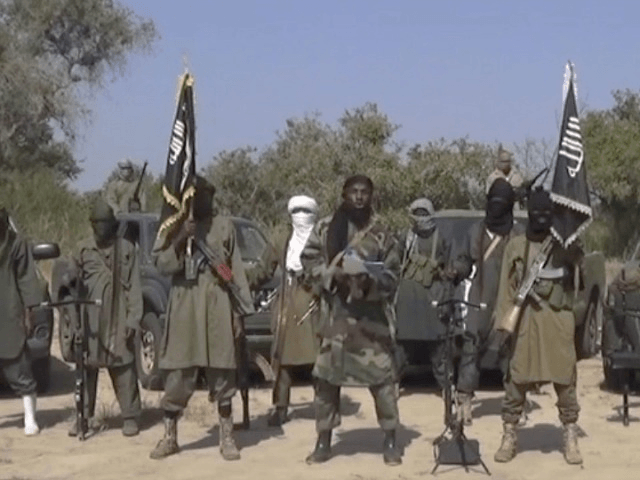Machete-wielding jihadists from the Islamic State (ISIS/ISIL)-linked Boko Haram group reportedly used the weapon to quietly slaughter the chief Imam and four others in a village located in the terrorist group’s birthplace in northeastern Nigeria, Borno state.
The attack took place on Sunday night in Kurmiri Village, which sits in the Titiwa Ward of Borno state’s Magumeri Local Government Area, reports Nigeria’s Daily Post.
On Monday, the Agence France-Presse (AFP) news agency learned from a local rescue worker and member of the Civilian Joint Task Force (JTF) that Boko Haram-linked female suicide bombers had killed and wounded dozens while they were receiving aid in a different Borno state village.
“There were twin suicide explosions at 11:10 a.m. in Mashalari village (near Konduga), which killed 15 and left 43 others injured,” an unnamed local rescue worker told AFP, echoing Babakura Kolo, a Civilian JTF member.
Boko Haram is increasingly using girls and women as suicide bombers.
The Daily Post identified the chief Imam who was killed by the jihadists on Sunday as Ustaz Goni Bukar Tabare, the elder brother of Mallam Goni Kundube, a prominent politician in Magumeri.
Referring to the deadly incident, the Nigerian news outlet reports:
Eyewitnesses said the attackers came into the village armed with Ak47 rifles, knives, and machetes but decided to execute their mission on their victims using machetes, because using guns will alert many residents to repel the attacks, even though, sources said, one of the attackers was arrested.
Alhaji Abubakar Abdulkadir, the caretaker chairman of the Magumeri Local Government Area, confirmed the massacre.
“Chief Imam of Kurmiri village and four other persons were slaughtered by suspected members of Boko Haram sect last night,” he told Daily Post.
“We regretted this attack, and we pray Allah … [for] the souls of the deceased and their families to bear the irreparable loss,” he also said, later adding, “I want to commend the effort of our Civilian JTF and other security agencies for their prompt action which led to the apprehension of one of the attackers.”
Borno state has recently experienced a series of deadly attacks at the hands of Boko Haram, including the killing of soldiers and abduction of several geological surveyors with the Nigeria National Petroleum Corporation (NNPC), a contracted staffer with the University of Maiduguri, and members of the Civilian JTF in July.
At the time of the ambush, the Nigerian military and self-defense group were providing security for an oil exploration convoy in northern Nigeria.
The Associated Press reported:
NNPC spokesman Ndu Ughamadu said only one of 10 geological surveyors who were abducted had been found. But the council chairman of Magumeri local government area, Zanna Modu, said soldiers were able to rescue four self-defense workers, two NNPC personnel and a staffer with the University of Maiduguri.
Maiduguri, the capital of Borno state, is considered the birthplace of the Nigeria-based Boko Haram terrorist group, officially listed as a terrorist organization by the United States.
Since it surfaced in 2009, Boko Haram has killed more than 20,000 people and displaced nearly 2.7 million.
Earlier this year, the terrorist organization vowed to impose Sharia law in the African countries of Benin, Mali, as well as nations in the continent’s Lake Chad Basin region—namely Cameroon, Chad, Niger, and Nigeria.
Boko Haram has suffered significant losses in recent months while fighting the U.S-backed Multi-National Joint Task Force (MNJTF), comprising Benin, Cameroon, Chad, Niger, and Nigeria.
In its latest assessment of the ISIS-linked organization, the U.S. Department of State reports:
Although degraded, Boko Haram continued an asymmetric campaign of kidnappings, killings, bombings, suicide bombers, and attacks on civilian and military targets throughout northeast Nigeria, resulting in a significant number of deaths, injuries, and destruction of property.
The group has a membership that “is estimated to be several thousand fighters,” acknowledges State, adding, “In addition to Boko Haram in West Africa, the most active of the ISIS affiliates were located in Afghanistan, Pakistan, Egypt, Libya, and Yemen.”

COMMENTS
Please let us know if you're having issues with commenting.